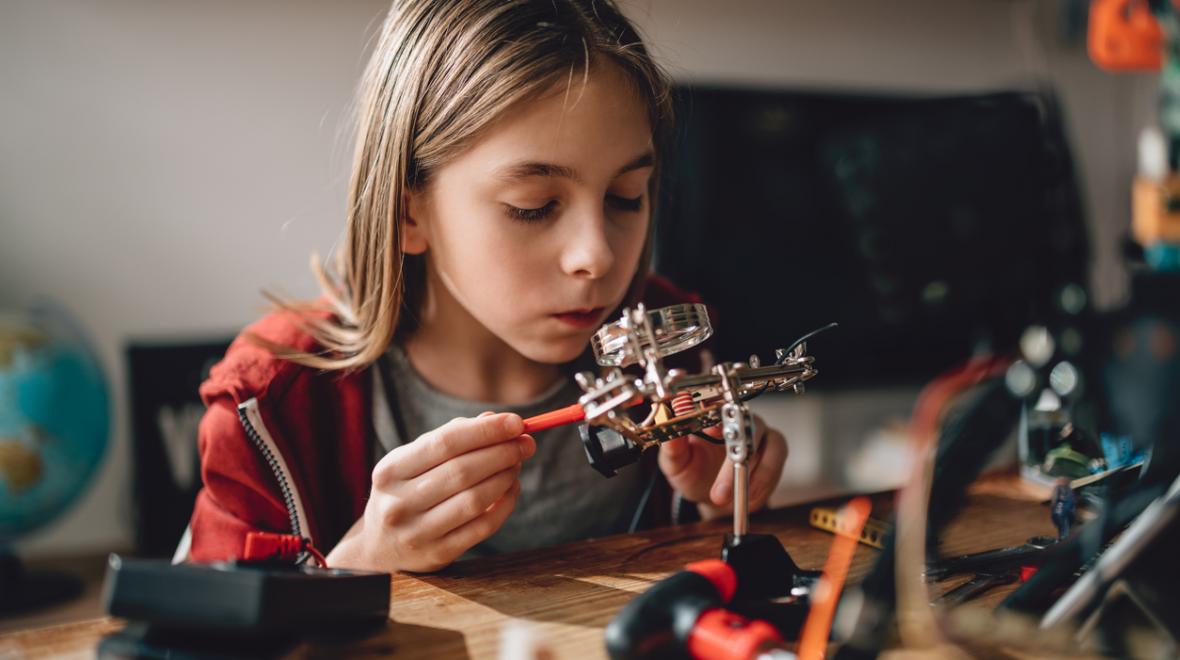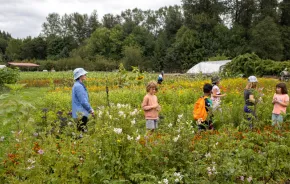
As schools scramble to figure out their plans for the upcoming school year, parents are likewise grappling to make difficult decisions about the options available to them. Should they keep their children in online classes (or some hybrid thereof) or commit entirely to the prospect of alternative education methods, such as homeschooling? It's a loaded question many have yet to answer.
How, then, can parents navigate and supplement a new world of remote learning through this educational, albeit existential, crisis? Look to parents who've been educating their children via alternative methods, including homeschooling, for years. Pre-pandemic, there were already 2.5 million children being homeschooled in America. Post-pandemic, that number is expected to grow by 500 percent. I'm a parent to four homeschooled children, and I can tell you that it's not as daunting as it may seem. That is, if you commit to it. Here are a few tips on how to get started.
Change your mindset about remote learning
For starters, let's stop characterizing remote learning as a crisis. Or a de facto failure of our educational system. No one knows for sure how long this pandemic will last, which means it's time to put a plan in place that everyone in the family, including the kids, can not only live with, but ultimately thrive from.
As a family lawyer who was for a time also divorced (I've since remarried and "blended" my family with my husband's), I had the opportunity to homeschool my four children for over a decade while also building my law practice. To some that may sound like a nightmare, if not an impossibility.
But I can assure you, as I do my clients, that, if approached from a perspective of gain rather than loss, you can find opportunities for your children to learn everywhere they look. I believe this is a mentality that parents should adopt for all facets of life, not just education. Your life is your classroom.
"Unschool" your children
Homeschooling families think outside of the box — a box that begins with brick-and-mortar schools — to unschool their kids. "Unschooling" is a non-traditional method of learning in which students operate in an unconventional learning environment. Parents who adopt the unschooling methodology teach their children math, world languages, English/literature and history/social studies lessons by making their environment, both inside and outside the home, their classroom.
In a traditional school environment, children are seated at desks for sometimes more than eight hours a day, with only a short break for lunch (and recess if they're still young). They're taught uniformly and must conform to the collective. For some children, that can mean giving up their individualism, losing the sparkle that makes them "them" along the way. These are the kids who come to resent learning.
With the "unschooling" model, you can teach your children their lessons outside and incorporate learning into their daily lives. In practice, this could work in the following way: For math, take your children to the grocery store. Divvy up the grocery list among them and have them shop for the items within a budget you set.
Take it a step further and ask your students to come up with a week's worth of recipes for the family (again working within a budget) and prep, if not cook, them themselves, depending on their age. Your child has just learned to add, divide, budget, measure, plan and oversee a project using real-life skills that will help them become independent adults who know how to take care of themselves.
If you have a child who doesn't love to read or like to read independently, let them spend part of their reading time listening to audiobooks while they hone their spatial relationship skills completing puzzles or knitting. Ask them what or whom they would like to read about — even a topic once considered uninteresting or daunting can become a real page-turner. Which brings me to my next point...
Help your children find their passion
The ultimate gem of homeschooling or other non-traditional learning methods is that parents can tailor them toward their children and how they learn best, turning them into lifelong learners. As your children experiment with different disciplines and subjects in a non-traditional environment, they'll discover what they do best and enjoy it at their own pace.
I've witnessed just how powerful discovering a passion can be with my teenage son, who always learned better outside the classroom than inside it. After expressing an interest in mechanics, I bought him a junker car as a gift. At the time, he knew very little, and I knew even less, which left him almost exclusively to his ingenuity and the resources he had at his disposal.
He used YouTube to learn how to do repairs and Amazon to order parts, and he restored the car to its former glory, along with his confidence. Then I bought him a second new — well, old — car to repair, and then another, while he cultivated a passion and talent for engineering. He never once needed to be in a traditional classroom environment to learn these skills, and now he wants to study to become an engineer.
Enlist help
Have to get on that conference call? Need to take a shower? Want to get in your daily exercise? Call in support — or Zoom them into your home. Whether it's an aunt, uncle, grandparent or family friend, you likely have a team of "experts" at your disposal you never realized existed. If you're separated or divorced, this team includes the "other parent," too.
After divorce, co-parenting can present difficult challenges for parents related to how to raise their children together now that they're no longer a couple, and this includes how to educate them. Throw in a potentially deadly novel coronavirus and the added dislocation of an ongoing pandemic, and separated and divorced parents find themselves more than ever facing challenges about how to best support their children's schooling not only from one home but from two.
Homeschooling presents a golden opportunity for co-parenting because it enables you and your ex to parent to your strengths. If you're good at schooling, be the one to teach a subject such as math. If you're the "fun" parent, try a family mountain biking trip designed to teach your kids science while outside. Both skills hugely impact the development of the children, and neither is more important than the other.
If one-on-one learning still presents too much pressure, consider joining a "micro pod," where families bring together groups of five to 10 students to learn together in a homeschooling or "unschooling" environment. Using this method, students capitalize on the socialization benefits of co-learning while minimizing the risk of virus transmission; and parents share the cost burden of hiring a professional teacher.
Barter for education
Implement a barter system. If you possess a skill, trade it. You're a great cook and know a teacher who hates preparing meals? Suggest preparing a few meals a week for that educator in exchange for providing lessons.
Don't forget about those experts you know, especially the retired ones: that neighbor or your mother's bridge partner. With years of experience in their respective fields, they have a wealth of information they'd likely be happy to trade, perhaps for grocery shopping or help with other errands, if you ask.
Embrace technology
Is a live person not available? No problem. Don't be afraid to incorporate screen time into your curriculum.
Websites such as YouTube offer hundreds and hundreds of educational channels. Many learning institutions offer online courses, for children of all ages.
Schedule family movie nights to create teachable moments. From documentaries to blockbusters, films spark thought-provoking conversations, not to mention opportunities to learn about history and literature, including how to identify story arcs and analyze characters.
Improve your children's "EQ"
Another essential but sometimes undervalued facet of childhood development is emotional intelligence. We need to alleviate the uncertainty children are feeling, especially right now; we don't know what's going to happen in the near future, and homeschooling is an opportunity to make the outside world feel a bit safer.
We can do this by safely exposing our children to the outside world — take your children hiking and show them all the birds. The ocean. The mountains. We fear the unknown, so when we can see, touch and feel the outside and know we’re still okay, we tend to feel less afraid.
Cherish the time
We didn't ask for it or want it, but the pandemic has forced us to slow down and take stock — of our health and all we hold dear. For many families, that has meant we are blessed with the opportunity to strengthen our familial relationships. How we educate our children is merely another conduit for doing so.
Children aren't the only ones who are learning. Parents are, too.











